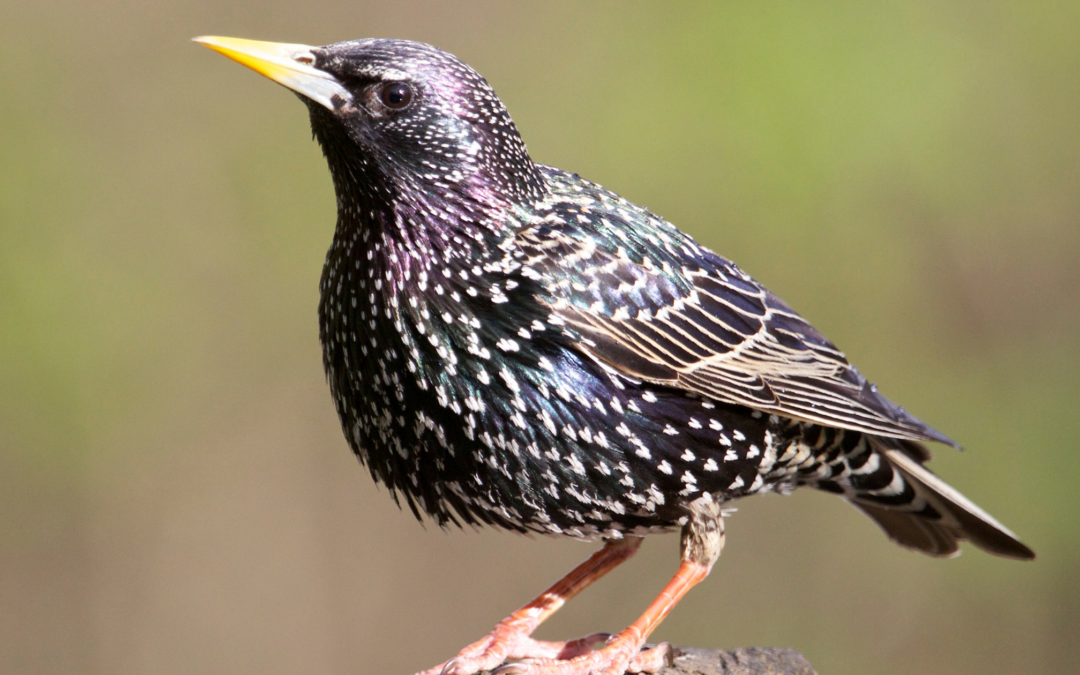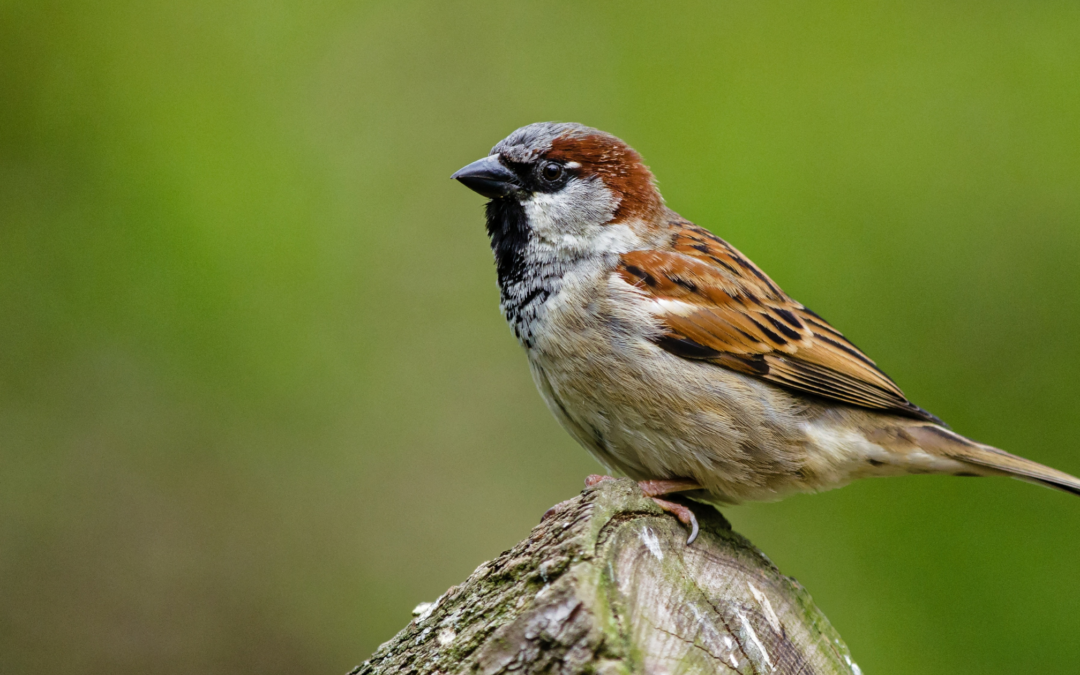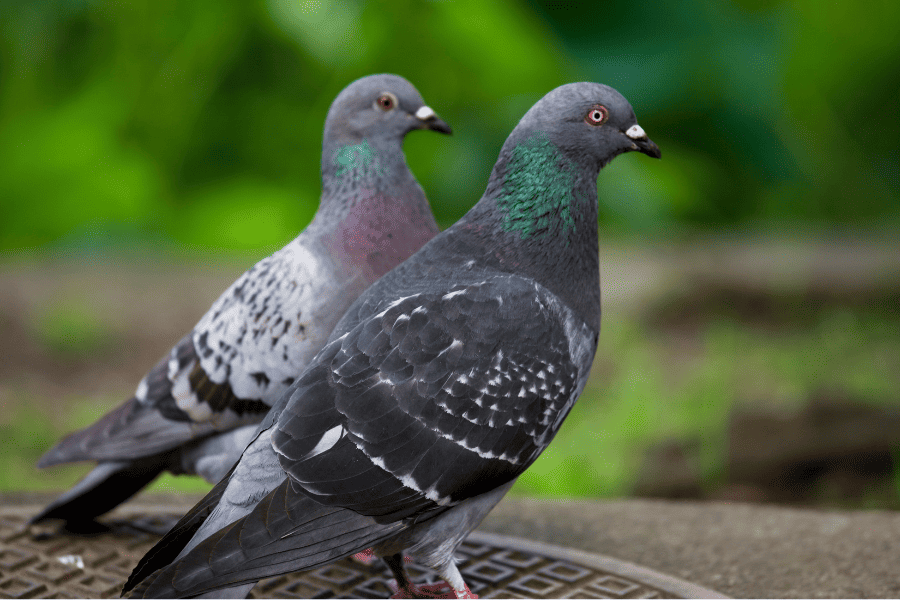READY TO GET STARTED?
REQUEST A FREE ESTIMATE
Fill out the form below or call (888) 466-7849 for a free, no-obligation estimate.

When it comes to pest control, most homeowners think of rodents, insects, or larger wildlife. However, one species of bird, the starling, can cause significant problems for property owners in Georgia. With their large flocks, destructive habits, and invasive nature, starlings have become a nuisance in both urban and rural areas. This blog will explore what starlings are, how to identify them, why they are considered a nuisance, and effective and legal ways to manage their presence around your home.
Starlings, specifically the European starling (Sturnus vulgaris), are small to medium-sized birds that were introduced to North America in the late 19th century. A group of bird enthusiasts, inspired by William Shakespeare’s references to the starling, released 100 of these birds in Central Park, New York, in 1890. What followed was an ecological domino effect that resulted in the species spreading across the entire continent. Today, starlings are classified as an invasive species in the U.S., meaning they compete with native birds and wildlife for resources, often to the detriment of local ecosystems.
Starlings are distinctive birds, making them relatively easy to identify. They have short tails, pointed yellow beaks, and glossy black feathers that shimmer with hints of purple and green in the sunlight. During the winter months, their feathers are speckled with white spots, adding to their recognizable appearance.
They are often seen in large flocks, especially during their breeding season in the spring and early summer. They are incredibly vocal, known for their variety of chirps, whistles, and even mimicking other birds and sounds. If you notice large groups of noisy black birds swarming your yard, you’re likely dealing with these nuisance birds.
Starlings are more than just noisy birds—they can cause significant issues for homeowners and the environment. Here’s why:
Starlings are omnivorous, meaning they eat both plant and animal matter. Their diet includes insects, earthworms, fruits, seeds, and grains. In urban areas, starlings often scavenge for leftover human food, adding to their reputation as a nuisance in populated areas. During the breeding season, their diet shifts to more protein-rich foods like insects, which they feed to their chicks. Their adaptability in diet allows them to thrive in various habitats, from urban areas to farmlands, making them difficult to control.
Given their ability to form large flocks and cause property damage, controlling starling populations can be challenging. Here are some effective and legal methods to reduce starling activity around your home:
The most effective way to deal with starlings is to prevent them from entering your property in the first place. Sealing off vents, chimneys, and other potential nesting sites can stop starlings from setting up nests in your home. Installing bird netting around high-traffic areas such as attics and eaves can deter them from gaining access.
Starlings are known to avoid certain visual and auditory deterrents. Hanging reflective objects like aluminum foil strips or installing bird spikes on ledges can make your home less appealing. You can also use sound machines that play predator calls or distress signals to scare starlings away.
Starlings are opportunistic feeders. Removing easy access to food by securing garbage cans, picking up fallen fruits, and using bird feeders designed to exclude starlings can reduce their presence in your yard.
For more extensive infestations, contacting a wildlife control company that specializes in bird control may be necessary. These professionals can implement more advanced strategies such as trapping or relocating starlings. In some cases, they may even use chemical repellents that are safe for both the birds and your family.
It’s important to note that while starlings are invasive, they are still protected under some federal laws. The Migratory Bird Treaty Act (MBTA), passed in 1918, protects many bird species from being hunted or harmed without a proper permit. However, starlings, along with other invasive species like pigeons and house sparrows, are not afforded the same protections under this law. This means that homeowners and wildlife services can legally take action to reduce starling populations on their property, as long as it is done humanely and within local regulations.
During the breeding season, starlings are especially active as they search for food and nesting sites. This is the time when large flocks can form, and their presence can become overwhelming for homeowners. It’s crucial to take preventive measures before the breeding season begins in the spring. By sealing entry points and removing food sources early, you can prevent starlings from making your home their nesting site.
Starlings, with their adaptability and invasive nature, can pose significant challenges for Georgia homeowners. Their large flocks, property damage, and competition with native species make them a nuisance that requires proactive control methods. By identifying these birds early and implementing exclusion and deterrent strategies, you can reduce the likelihood of a starling infestation. If your starling problem persists, contacting a professional wildlife control company that specializes in bird control can ensure the issue is managed legally and effectively.
Whether you’re dealing with starling flocks or preventing them from nesting in your home, understanding these nuisance birds and taking swift action is key to protecting your property and local wildlife.

Birds can be charming creatures, often bringing a touch of nature to urban environments. However, when it comes to commercial properties, birds can become a significant nuisance and even a health hazard. From unsightly droppings to potential property damage and health risks, preventing birds from nesting or roosting around your business is essential. In this blog, we will explore the challenges birds pose to businesses, the importance of bird control, and effective strategies to keep your property bird-free.
Birds can cause numerous problems for commercial properties, including:
Implementing effective bird control measures is crucial for maintaining a safe, clean, and professional business environment. Here’s why bird control is important:
Birds can pose significant challenges to businesses, but with the right strategies, you can prevent them from becoming a nuisance. Contact your local pest management company near you today to schedule an inspection and protect your business from the challenges posed by birds.

Nestled in the heart of the South, Georgia boasts lush landscapes and vibrant wildlife. However, along with its natural beauty comes the challenge of dealing with nuisance birds. From pesky pigeons to assertive seagulls, these feathered intruders can wreak havoc on homes and businesses alike. In this guide, we’ll explore common nuisance birds found in Georgia, the risks they pose, effective methods for bird control, and preventive measures to keep your property bird-free.
Georgia is home to a variety of bird species, some of which can become unwelcome guests on your property. Among the most common nuisance birds encountered in the state are:
Beyond their irritating presence, nuisance birds can pose several risks to both property and human health:
When faced with a bird problem, it’s essential to employ effective bird control strategies. Here are some methods commonly used by wildlife control companies:
While effective bird control measures can help address existing bird problems, preventing future infestations is key to long-term success. Here are some preventive measures to consider:
Dealing with nuisance birds can be a challenging task for property owners, but with the right approach, it’s possible to keep these feathered intruders at bay. By understanding the common nuisance birds found in Georgia, recognizing the risks they pose, and implementing effective bird control and prevention strategies, you can protect your property from damage and ensure a bird-free environment. Whether you’re facing a minor bird problem or a full-blown infestation, partnering with a reputable wildlife control company can provide expert assistance in addressing your bird control needs.

When left unaddressed, birds can wreak havoc on your business. As a business owner, protecting your reputation and bottom line is crucial to your success. We breakdown the dangers nuisance birds can be to your business if invaded and bird control methods you can place to deter them away.
Birds can cause many problems for your business and property. It’s crucial to understand the issues birds can bring so you can effectively deter them.
One of the best ways to deter these nuisance birds away is to create an environment that’s less attractive to them. Check out these humane preventative tips to keep birds from invading your business.
This method can act as a barrier to keep birds away from your building. The netting is often made of polypropylene and has stainless-steel hardware, which can be invisible to your customers’ eyes. It can best protect your business from smaller birds like swallows and sparrows. Bird netting can protect areas such as loading docks, rooftops, courtyards, storefront signs, balconies, open beam structures, and more.
Spikes are harmless deterrents that work great to deter birds, such as pigeons, away from a structure. Spikes are made from stainless steel or plastic and are placed upward to make it difficult for birds to land or make it uncomfortable to roost. Spikes can be placed on ledges, parapets, gutters, signs, and more.
Visual deterrents or decoys are a great tool to utilize around your business property to deter birds. Decoys that resemble owls or other predators can scare birds away. Other deterrents include holographic and reflective materials like optical gel, scare tape, and more. This method can be a great addition to other bird control methods you have already placed at your business.
If you’ve seen more bird activity than you’re comfortable with around your business, call your local professional wildlife control team for assistance. These bird experts will provide you with the best options to prevent the nuisance birds, deter them from your property, and control them to avoid a future bird infestation.

Did you know birds can be just as much of a nuisance (and potential health threat) as roaches and rodents? Common nuisance birds include pigeons, woodpeckers, sparrows, starlings, and Canadian geese.
Birds can cause a whole host of problems around your home and property. They can fly into your home and windows. They can build nests on or near your home, causing damage to your house or just being a noisy pest. Nests can clog gutters, downspouts, drains, vents, and chimneys. Bird droppings contain uric acid and can eat away at paint and building materials on cars and homes.
Birds and their droppings are known to carry over 60 diseases including E. coli, salmonellosis, and cryptococcosis.
Anytime you’re dealing with birds it’s important to remember that many species are protected by federal and/or state regulations, as is bird nest removal.
Visual bird deterrents are products designed to scare off birds or prevent them from landing or roosting where you don’t want them to. Their efficacy depends on the type of bird you are dealing with and the type of deterrent you are using. There is a wide range of choices when it comes to these deterrents. Many include gel because its reflective surface looks like fire to birds. It also feels sticky if birds land on it. Some of these deterrents are also scented, many with peppermint oil, to also help deter birds from getting near them.
Predator decoys can be effective for a short period of time but aren’t usually good for long-term use. It is important to choose a realistic predator for the bird species you are dealing with. If owls aren’t a natural predator of the bird you are dealing with, a decoy owl won’t work very well. It is also important to rotate or move the decoy frequently so birds don’t realize it isn’t real.
There is a wide range of products you can use as a reflective deterrent, from prefabricated spirals to DIY aluminum foil strips. The most important thing to remember is to use something highly reflective that also moves with the wind. It also helps to move it around frequently or even take it down for a while to trick the birds into thinking it’s real.
These are narrow spikes that attach to window sills, roofs, eaves, or any other large areas you want to keep birds off of. They can attach to concrete, wood, or other surfaces with screws or glue. The spikes can be metal or plastic. These deterrents are most effective against pigeons, crows, and gulls and are less effective against smaller types of birds.
Bird coils are similar to spikes. They are extendable stainless steel coils that stretch along ledges to deter birds from landing on them. If they do, the coils move and make the bird feel unstable, making them less likely to perch and roost.
Bird wire is a tension wire system that creates an unstable landing area to deter birds from landing. Bird wire is more low profile compared to spikes or coils and can be used on exposed ledges, beams, and pipes. The negative to bird wire is that it can be time-consuming and difficult to install.
Bird netting is commonly used in gardens or on fruit trees but can also be used under roofs and around eaves. Bird netting is less expensive than other deterrent methods. It is important to remember when installing bird netting that you don’t cut out sections of the net to fit around obstructions; instead, cut a slit in the netting, slide the obstruction through it, and then reseal it when it’s above the object. One negative to netting is that birds can get stuck in the net.
Birds usually come to your home or yard in search of a nesting site, food, or water. Eliminating these things will make your property less appealing to them. Install bird netting over gardens to keep them from getting to your fruit. Keep trash cans covered. Clean your gutters to prevent standing water or install gutter guards. Don’t use birdfeeders in the warmer months. If you do use birdfeeders, don’t use suet or corn in them. Instead, replace with whole peanuts, safflower seeds, or sunflower seeds in the shell.
The best way to keep birds out of your home is to make sure they don’t have a way in. Carefully inspect the exterior of your home or other outbuildings and seal any openings you find, especially those that lead to the attic. Block any openings to eaves or vents with 1/4″ wire mesh or netting.
Bird and bird nest removal can be a difficult (and sometimes illegal) job. If you have a problem with birds this season, contact your local pest control company who can properly identify the types of birds you are dealing with, along with the most appropriate elimination and prevention methods for you.
What Attracts Snakes to Your Yard?